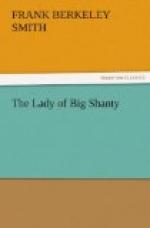“One day Bailey went off to Montreal, where Bergstein had a place fixed up for her. I’d been off trappin’ up Big Shanty, and when I come back home next night she was gone. She didn’t come back for most a week, and when she come I see she was drunk. Bailey come back the next day. I sot waitin’ for him on the store porch. When he see me he come up to me uglier’n sin. ’Who in hell invited you? he says. He weighed twice as much as me, and I see he was fightin’ mad. He leapt like a cat to one side of me and ’fore I knowed it he had me down. Them what was in the store come out, but thar warn’t one of ’em that darst lay hands on Bailey. We wrastled some in the road—the dust blinded me. Then he begun to kick me in the mouth and back; I couldn’t see for the blood. When I woke up I was to home and I seen she was gone. Bimeby I crawled out of bed into the kitchen and I see Ed Sumner settin’ ’longside the stove. ‘Bob,’ says he, ’he used ye awful, no use talkin’—he liked to killed ye; I hauled him clear o’ ye and carried ye back home. Ye’d better git back into bed,’ says he. ‘Doc’ Rand’ll be here ‘fore long; I’ll be back in an hour,’ says he. ’Fore I knowed it he was gone. That was ‘bout three o’clock; the sun was shinin’ warm in the kitchen and I sot thar thinkin’ and gittin’ steadier and madder. Bimeby I filled the magazine of my Winchester and started to find Bailey. Thar was more’n a dozen on the store porch when I come up. When they seen me they slunk back in the store and shut the door. I stood thar waitin’ in the road; then I see Bailey come out. ’Hain’t you got your satisfy?’ he says, ‘you—’ and I see him jerk out a revolver. He was jest steppin’ off the porch when my first ball hit him. He give a scream, tumbled in the road and started to git up on his hands and knees; the second ball broke his neck. Then I walked into the store. ‘I’m through,’ I says, ’but the first man that lays hands on me I’ll kill same’s I killed him.’ Thar warn’t none of ’em that spoke or moved. What I needed I took and paid for; a box of ca’tridges, matches and a can of beef. I had a dollar bill and I laid it on the counter and walked out the store and started into the woods. That’s the hull of it, Mr. Thayor. ’Sposin it had been your wife, or your leetle gal. You’d hev done the same’s I done, wouldn’t ye?”
Thayor breathed heavily.
“Wouldn’t ye?” insisted Dinsmore. “He ruined her, body and soul—he stole her, I tell ye; he warn’t satisfied with that—he got her to drinkin’. Wouldn’t ye a-killed him, Mr. Thayor?”
Thayor’s eyes sought the shadows between the pines; for an instant he did not reply. Suddenly Sperry’s face loomed before him and as instantly vanished, only to appear again as certain excuses hitherto explainable became for the first time obscure and suggestive. Then the words of Alice’s song rang in his ears and a thrill of joy quivered through him.
Again the hide-out repeated the question.




